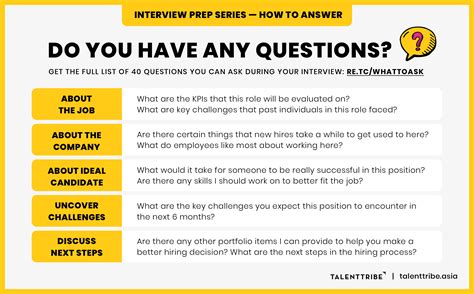Responding To: "Any Questions For Me?"

It’s the end of a job interview, and the interviewer asks, “Do you have any questions for me?” Many candidates make the mistake of saying “No, I think you’ve answered everything.” This is a missed opportunity to learn more about the company and the role, and to show your interest and enthusiasm for the job. Asking thoughtful questions can leave a positive impression on the interviewer and help you make an informed decision if you receive an offer.
Why It’s Important to Ask Questions
Asking questions demonstrates your curiosity, engagement, and critical thinking skills. It also shows that you’ve done your research and are genuinely interested in the company and the role. By asking questions, you can:
- Clarify any doubts or uncertainties about the job responsibilities, requirements, and expectations.
- Learn more about the company culture, values, and mission.
- Understand the team dynamics, reporting structure, and growth opportunities.
- Find out how the company measures success and what challenges they’re currently facing.
- Showcase your relevant skills, experiences, and achievements by asking targeted questions.
How to Prepare for Questions
Before the interview, research the company, the industry, and the job position. Read the job description and the company’s website, social media, and press releases. Look for recent news articles, reviews, and ratings. Check out the company’s competitors, partners, and customers. Use the information you gather to tailor your questions to the specific context and to avoid asking generic or irrelevant questions.
Some questions you can ask are:
- What are the biggest challenges facing this company in the next few years?
- How does the company measure success?
- What are the key qualities you’re looking for in the ideal candidate?
- Can you tell me more about the team I’ll be working with?
- What opportunities are there for professional development and advancement?
- How does the company foster a diverse and inclusive workplace?
- What does a typical day in this role look like?
- What are some of the company’s recent achievements?
- How does the company handle conflicts or difficult situations?
- What are some of the common traits of successful employees at this company?
What to Avoid When Asking Questions
While it’s important to ask questions, it’s equally important to avoid asking inappropriate or unprofessional questions that could hurt your chances of getting the job. Avoid asking questions about:
- Salary, benefits, vacation time, or other compensation-related issues.
- Personal or sensitive information about the interviewer, such as their age, ethnicity, religion, or marital status.
- Anything that was already covered in the job description or previous discussions.
- Negative or critical comments about the company, the industry, or the interviewer.
Conclusion
Asking questions at the end of an interview is an opportunity to show your interest, curiosity, and fit for the company and the role. By preparing thoughtful and relevant questions, you can demonstrate your strategic thinking, problem-solving skills, and cultural fit. Avoid asking inappropriate or unprofessional questions that could harm your chances of getting the job.
FAQs
What are the benefits of asking questions at an interview?
Asking questions can help you clarify doubts, learn more about the company and the role, understand the team dynamics and growth opportunities, and showcase your relevant skills and experiences.
What questions should I avoid asking at an interview?
Avoid asking questions about salary, benefits, personal information about the interviewer, anything that was already covered in the job description or previous discussions, or negative or critical comments about the company, the industry, or the interviewer.
How can I prepare for questions at an interview?
Research the company, the industry, and the job position before the interview. Read the job description and the company’s website, social media, and press releases. Look for recent news articles, reviews, and ratings. Check out the company’s competitors, partners, and customers. Use the information you gather to tailor your questions to the specific context and to avoid asking generic or irrelevant questions.
